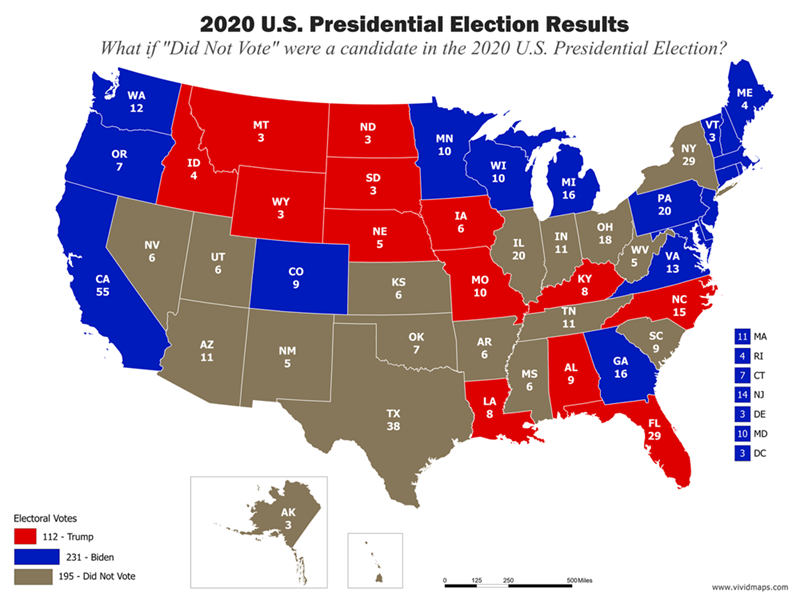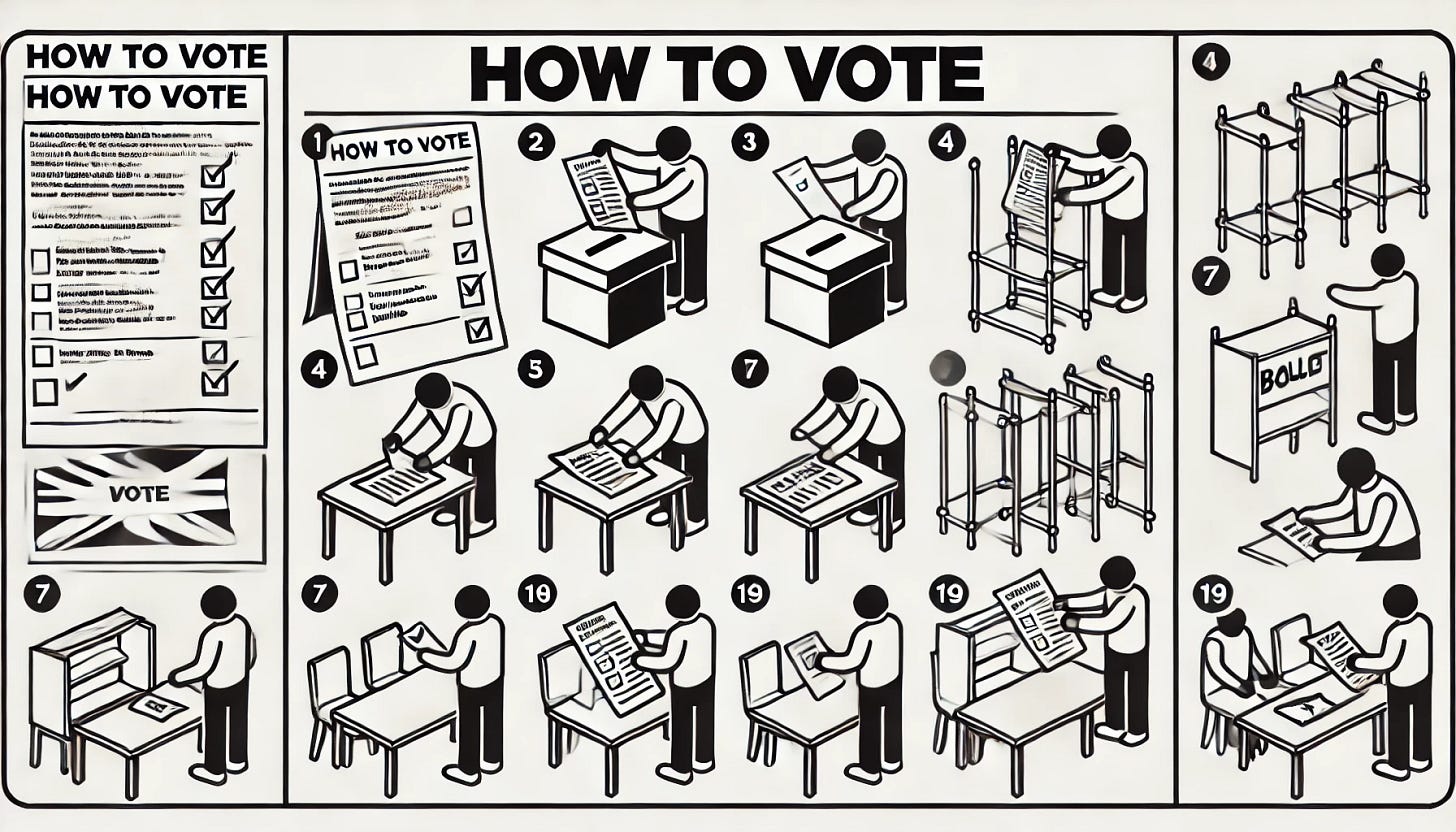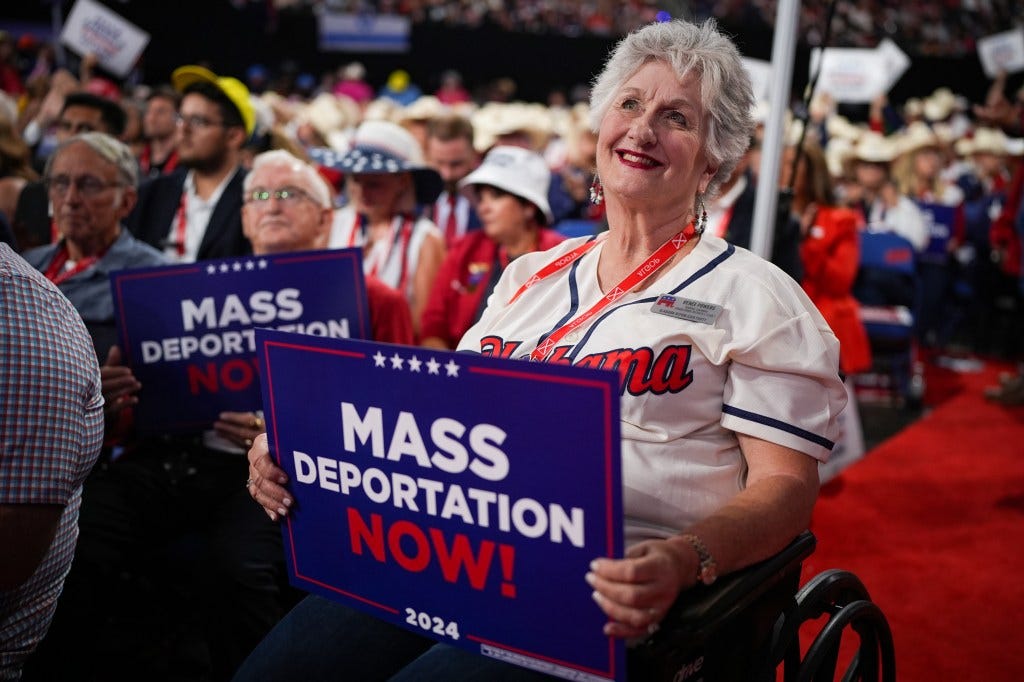How to vote for president
(and why you should)
If you follow me on Twitter (which I don’t really encourage) you probably already know that I plan to vote for Kamala Harris in the next presidential election, despite my frequent criticism of the current administration. A friend and longtime reader reached out and asked me to explain my reasoning. Here is my best attempt.
Inside this issue:
How to vote for president (and why you should)
What a vote for president actually means
Remember to vote for democracy itself
How to vote for president (and why you should)
In America there are four possible ways to approach the presidential election. You can vote for either of the two major party tickets (either Democratic or Republican), you can vote for a third-party candidate (e.g. RFK Jr) or you can choose not to vote at all.
Regrettably, American presidential elections are decided by the Electoral College rather than the popular vote. As a resident of Oakland my vote won’t be used to decide who the president should be — it will only be used to decide who gets California’s electoral votes. But we already know who will win California — it’s been an uncontested Democratic stronghold for decades. There is ~zero chance that my vote will have any impact on the outcome of the presidential election. Only voters in swing states have a meaningful opportunity to actually choose the president.
That’s why "Didn’t vote!" is consistently a leading political movement in America.

The Electoral College is a bad system but it is naïve to conclude that it means only a handful of votes actually matter. To a first approximation, politicians are herd animals. They are more eager to follow the public than to lead them. To influence the behavior of politicians you have to make your preferences visible. The presidential election is the largest meaningful conversation that American democracy has with itself about what it wants. To participate in that conversation, you have to vote.
In a better world you could vote by simply choosing the candidate that best represents your values and policy preferences — but here again America’s primitive electoral machinery makes that choice a complicated one. Rather than being able to rank candidates in their preferred order American voters have to collapse their preference down to a single choice.
That means voters have to balance how well a candidate represents them with how large a constituency that candidate can appeal to. The perfect candidate for you probably can’t build a winning coalition. The candidate with the best chance of building a winning coalition probably isn’t the perfect candidate for you. The game theory of first-past-the-post voting systems is inexorable: larger coalitions win until you eventually end up with two dominant parties vying for control exclusively with each other.
Third-party candidates in America are either completely irrelevant or spoiler candidates that effectively serve as a symbolic way to "withhold" your vote from whichever major party coalition you would otherwise prefer. From my perspective that’s a fundamentally pyrrhic strategy — it is designed to weaken the political coalition it has the most in common with. Voting for a spoiler candidate is joining a political coalition composed entirely of people who have already rejected larger coalitions. It’s very unlikely to mature into a serious political movement.
There are third party candidates that I think come to represent genuine political values, like Ross Perot and the deficit or Ralph Nader and consumer rights — but I don’t actually think RFK Jr. is one of those candidates. I think he’s just harvesting the chaos of this cycle to pick up stray voters and is pretty openly trying to sell them back to both parties in exchange for a position in their respective administrations. Voting for RFK Jr. doesn’t represent support for any signature issue — unless your signature issue is making sure RFK Jr. has a nice, cushy job next year.
So, like most Americans, I will vote for one of the two major party candidates despite knowing that my vote won’t affect the outcome and that my chosen candidate won’t really represent my political views. As I have written about before, the purpose of democracy is not to make perfect decisions. It is to make imperfect decisions together. Even if your vote never changes the outcome of a single election, voting is still a way of ratifying your ongoing commitment to the machinery of democracy itself. Every vote is a vote for America.
What does a vote for president actually mean?
According to the Pew Research center the top political issues that Americans are concerned about this election cycle:
This isn’t necessarily how I would rank issues by importance, but I don’t get to set the terms of the conversation. America’s political class will interpret the election results as being about these issues — so those are the issues that I have the opportunity to express my opinion on.
Being a single issue voter is only meaningful if your single issue is one that other people are paying attention to. Pivoting my vote on a niche issue (e.g. Bitcoin) would just be voting carelessly — my vote will just end up being interpreted as part of that coalition’s mandate to pursue their preferred policies on the issues listed above. Nobody will pay attention to my esoteric bullshit. The only outcomes that matter in democratic elections are outcomes that involve lots of people at the same time.
So, let’s consider the issues:
Inflation / Federal Deficit: I don’t expect either party to reduce money printing by the central banks. As Lyn Alden frequently says: Nothing Stops This Train. Democrats like entitlements and Republicans like tax cuts but nobody is actually serious about trying to reduce debt or balance the budget. Inflation is too complex for ordinary voters to understand, which means it is too complex for ordinary politicians to be honest about. Money printer go brr.
Bipartisanship: The Republicans have made refusal to reach across the aisle a signature campaign strategy since Obama. Just a few months ago the Senate Republicans rejected a bipartisan immigration reform bill specifically because Trump thought it would help Biden get re-elected. I don’t think the Democrats are models of co-operative virtue or anything but it’s obvious which party is more interested in bipartisan action.
Healthcare: Democrats will praise the Affordable Care Act and Republicans will complain about it but neither has the political will to transform it. Trump has had 8 years to come up with a coherent healthcare policy proposal, it would be foolish to expect him to produce one at this point. Democrats have offered proposals to iterate/improve on the ACA, but Republicans would prefer to keep making insincere promises to dismantle it. I don’t think they have the guts.
The Opioid Crisis: This is a genuine American tragedy and I wish it occupied more of our collective attention. I am not satisfied with either party on this issue, but I am especially contemptuous of Trump’s willingness to blame America’s opioid problem on illegal immigrants and asylum seekers. In reality the vast majority of fentanyl is smuggled in by American citizens during legal border crossings. Lying about the opioid crisis to score cheap political points is the opposite of doing anything to solve it.
Immigration: I straight up do not agree that immigration is a problem. Delegates holding up "Mass Deportation Now" signs at the Republican National Convention make me sick. Anything approaching a policy like that would be economic suicide and moral abomination. America is a country built by immigrants. Immigration makes us strong.
Gun Violence: The official Republican policy on mass shootings is thoughts and prayers. That’s a complete abdication of responsibility. This is the only country in the world where this happens. It needs to stop.
Violent Crime: Overall violent crime in America is down significantly and has been since the 90s. The main reason people worry about it is because politicians and the media stoke people’s fears to exploit them. Crime doesn’t strike me as a critical priority this cycle but it does seem like former prosecutor Kamala Harris would probably be tougher on crime than convicted felon Donald Trump.
Moral Values: I truly cannot fathom the mindset of a person for whom moral virtue is a key priority but who also plans to vote for Trump. The man cheated on his pregnant wife with a porn star. He is notorious for bankruptcies and unpaid bills. He lies so constantly that no one even really notices or treats it like lying anymore. His whole deal is like an explicit rejection of moral virtue.
K-12 Education: Fun fact! I grew up in Minnesota and most of my family still lives there. I have been a huge fan of Tim Walz’s school lunch program since it launched, well before it reached national attention. Feeding children is a great political litmus test. No just society should ever tolerate hungry children. Investment in public schools in general has tremendously positive effects on society as a whole.
Terrorism (Domestic & International): During his tenure as president Trump was an unpredictable force on the global stage, which increased global chaos and IMHO did not make America safer from international terrorism. The most serious domestic terrorist threats come from Trump’s base: his supporters literally stormed the Capitol. Harris has no specific experience or relevant history in dealing with terrorism that I know of but Trump has a very well established track record of making the risk of terrorism significantly worse.
Infrastructure: The Biden/Harris administration passed the Infrastructure and Jobs Act, i.e. the largest infrastructure bill in decades. Trump’s administration invoked the idea of "Infrastructure Week" so many times that it became a running joke but he never actually passed any major infrastructure legislation.
Racism: Trump began his presidential campaign by calling Mexican immigrants rapists and his recent appearance at the National Association of Black Journalists suggests nothing much has changed. As Biden put it recently: before the Trump presidency, the Ku Klux Klan used to wear hoods.
Unemployment: I personally don’t think the president has that much direct influence over the economy, but historically the economy has performed better under Democratic presidents. One thing I do think presidents have quite a bit of authority over is the largest single employer in the economy: the Federal government. During Trump’s presidency there were three government shutdowns, including the longest in American history. That is about as material an impact on unemployment as a president can possibly have.
Remember to vote for democracy itself
A consistent thematic throughline in contemporary American politics is that while I often disagree with Democrats about their preferred policies and solutions, I think they are mostly focused on real problems. The modern Republican party on the other hand (especially the Trump wing of it) seems uniquely fixated on problems that are not real. There was no election fraud. There is no gender crisis. Migrant caravans are not invading America. Violent crime is not destroying our cities. Free school lunches are not communism. Drag queens are not grooming our children.
These manufactured crises are nakedly cynical attempts to manipulate the electorate and even if you agree with the underlying policy goals lying to the voting public is a direct attack on democracy itself. Trump has been very clear about his willingness to undermine democracy when it suits his personal and political interests. He was clear he would not concede the last election and he has been clear that he doesn’t intend to concede the coming election if he loses, either.
The peaceful transfer of power is the hallmark of American democracy and voting for Trump puts that legacy in jeopardy. There is no policy, no legislation, no judicial appointment that is worth risking centuries of American tradition.
Vote for Kamala Harris.












You have been brainwashed, sorry to see that.